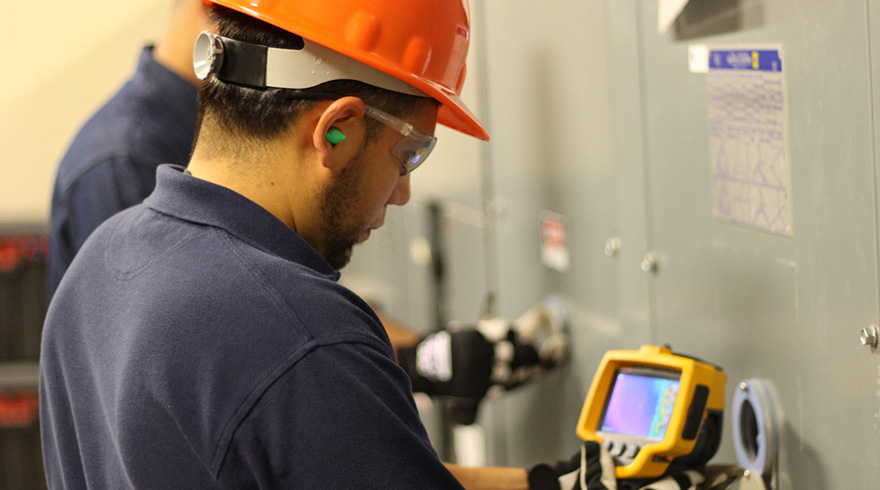Five Things You May Not Realize About Electrical Maintenance

The most common reasons for a commercial building team to call TDIndustries for electrical maintenance are: a power failure, a hot panel noticed during a breaker reset or nuisance tripping that continuously needs to be addressed.
No known electrical issues right now? No news isn’t necessarily good news. TDIndustries’ skilled electrical technicians recommend annual infrared panel scans as an indispensable predictive and proactive maintenance tool.
What happens during an infrared panel scan?
Your TDIndustries electrician removes all the covers on your buildings’ electrical panels and uses a non-contact portable infrared imaging device while the system is under load. The device detects energy emitted from an object, converts it to a video signal and reproduces it as an image on a monitor.
When a component with an abnormal temperature differential is detected, the image displayed on the monitor is recorded. These images, along with probable cause and recommendations, provide you with the necessary information to correct these potential failures.
When a potential problem is located, additional information is gathered to determine probable cause, actual temperature, approximate emissivity and temperature rise above an identical component or phase under a similar load.
The temperature rise and size or type of component determines priority level in our customized repair guide.
Five key points to remember
- Annual infrared panel scans are recommended. Your TD Service technician uses a thermal infrared camera to look for hot spots, possible overloads and loose connections inside all building electrical panels. Aluminum wiring, a less expensive option for construction, requires more maintenance than copper wiring.
- Electricity constantly vibrates. Electrons move through a wire from the negative end to the positive end through a conductor, or wire. The flow is called electric current. Vibration over time loosens wires, so regular maintenance and tightening is necessary.
- Loose connections can cause arcs. Electricity still runs through a loose connection; it can cause arcs that will become hot. Arcs damage the wire, can damage the breaker and in some cases will even damage the inner components of the electrical panel.
- Poorly maintained components still work for a while. Loose connections can go undetected and become more severe with time. Most clients are surprised by what we find in their systems. Regular tightening and cleanup prolong the life of electrical components and your equipment.
- Proactive maintenance protects occupant safety. A weakened or poorly maintained electrical system is a fire risk. Many commercial insurers offer discounts for regular infrared panel scans. The National Fire Protection Association (NFPA) requires that only trained and qualified employees can work on or near exposed energized electrical parts and supervise unqualified persons in the vicinity of the hazard. Another requirement of NFPA 70E (Arc Flash) is the implementation of an overall electrical safety program.
Beyond infrared imaging
An electrical system tuneup can also include inspection, torque and cleaning of any of the following components:
- Automatic Transfer Switch (ATS)
- Bus Duct (BUS)
- Circuit Breaker (CB)
- Control Cabinet (CC)
- Current Transformer (CT)
- Disconnect Switch (DISC)
- Distribution Panel (DP)
- Emergency Distribution Panel (EDP)
- Emergency Power Panel (EPP)
- Emergency Power Transformers (EXFMR)
- Environmental Control Unit (ECU)
- Fire Pump Panel (FPP)
- Generator (GEN) Incoming Lines (IL)
- Lightning Arrestor (LA) – if it’s at the main system
- Lighting Contactor (LC)
- Metering Cabinet (MET)
More from the Blog
When and How to Change Out Your Small HVAC Units
Small HVAC unit changeouts can be stressful because you never really know when they’re coming. Without...
Five Building Automation and Controls Myths
Your roles and responsibilities in building operations and maintenance have never been more essential....
Open-System Controls Solution Solves Chemical Manufacturer’s Maintenance Delays
Facility managers at a global chemical manufacturer were frustrated by delayed provider responses for...
Subscribe to our blog
Please provide your email address to subscribe!
